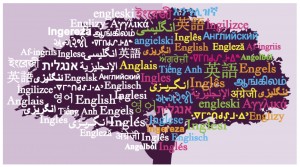By 2115, it’s possible that only about 600 languages will be left on earth as opposed to today’s 6,000. So what will the languages of the future be, and how will they change?
English Dominates Spoken Language – Will Others Survive to Be Languages of the Future?
Over one thousand years ago, English was the spoken language of Germanic tribes in Europe. Today almost two billion people, soon to be every third person in the world, speak modern English. Gradually over time through economic, technological, and cultural influences English has become a world language.
So what will this mean for other languages? Will other dominant languages be eliminated, or will they just become secondary to English? Many speculate that the spread of English just means that people in each country will tend to use a local language to communicate within their own country, and English for communication beyond their nation’s borders. We already see this trend when it comes to international business, travel and inter-border communication.
With the passing of time, languages become more complex and expand on existing vocabulary. This is what makes them rich, but at the same time more challenging to learn. For example, the importance of tonality in the Chinese language cannot be easily learned by most native English speakers. This makes the passing on of the language to non-native speakers less likely to be successful. Thus, there is a low probability of Chinese overtaking English despite the growing number of native speakers in the world today.
What Will Change With the Languages of the Future

- There will be fewer languages.
- Languages will be less complicated.
Therefore, speaking the languages of the future may be easier than what we experience today – but how will they evolve over time?
Language Simplification Predicted for Future World Languages
Future language trends appear to be less likely to maintain formal, more complex forms of language. The languages of the future will instead move toward a simpler structure influenced by technology use and globalization. This streamlining of older languages is something that we have already witnessed with the revival of Irish Gaelic and its transformation into modern Gaelic. The simplification, or optimization, of older languages in this manner will make learning them easier for the next generations and non-native speakers. Some linguists predict that this may in fact be beneficial. Despite the use of fewer languages, for the most part communication will be made easier since many people will be able to effectively speak a unifying language,while maintaining their own more simplified native language within their work and personal spaces. What this means for the future of language translation services is hard to say; however, the Tower of Babel may no longer be something to fear in the future.
About Language Connections:
Language Connections is one of the top language service companies in the US. Over the last 30 years, we’ve focused on providing the best business translation services, interpreting services, as well as interpreter training and customized language training programs. In addition to top-tier corporate language training, we offer certified corporate interpreters and professional business translation services in 200+ languages. Our network includes linguists with backgrounds in all major industries. They’re ready to meet your needs, whether they’re for technical translation services, legal translation, government translation services, international development translation services, education translation services, life sciences translation, or something else. Reach out to us today for a free quote on our cost-efficient and timely translation services, interpreters, or other linguistic services.
Language Connections Inc.
2001 Beacon Street, Suite 105,
Boston, MA 02135
Phone: +1-617-731-3510
Email: service@languageconnections.com


